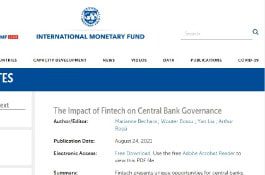Fintech presents unique opportunities for central banks. The rapid changes in technology that are transforming the financial system will allow central banks to enhance the execution of various of their core functions, such as currency issuance and payment systems. But some aspects of fintech pose major challenges. Central banks have always been at the cutting edge of financial technology and innovation. In the past, the invention of the banknote, the processing of payments through debits and credits in book-entry accounts, and the successive transitions of interbank payment systems from the telegraph to internet protocols were all transformative innovations. Today, central banks are facing new and unprecedented challenges: distributed ledger technology, new data analytics (artificial intelligence [AI] and machine learning), and cloud computing, along with a wider spread of mobile access and increased internet speed and bandwidth. The purpose of this note is to discuss the authors’ preliminary views on how, from a legal perspective, central banks can best deal with the impact of fintech on their governance. These preliminary views are based on a review of central banks’ reaction thus far to the challenges posed by fintech to the legal foundations of their governance.
The impact of fintech (financial technology) on central bank governance – fintech notes offering practical advice from IMF staff members to policymakers

